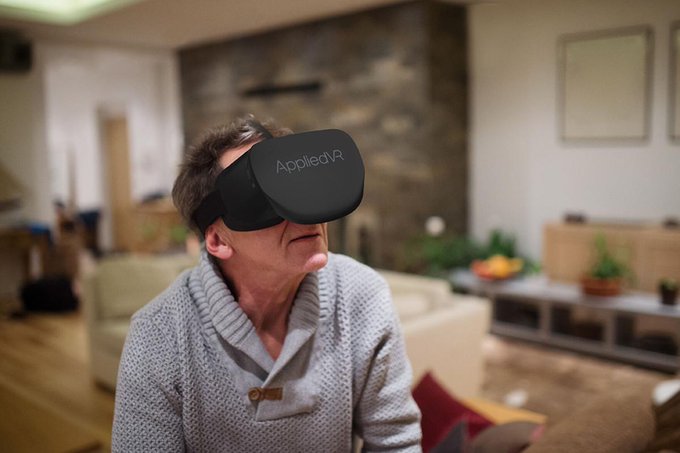
October 21, 2020 – AppliedVR, a provider of virtual reality (VR) therapeutics and immersive treatments, has today announced that its EaseVRx product has received “Breakthrough Device” designation from the US Food and Drug Administration (FDA) for treating treatment-resistant fibromyalgia and chronic intractable lower back pain. EaseVRx is now one of the first VR digital therapeutics to get breakthrough designation to treat conditions related to chronic pain, according to the company.
The FDA Breakthrough Device Program helps patients receive more timely access to breakthrough technologies that could provide a more effective treatment or diagnosis for life-threatening or irreversibly debilitating diseases or conditions.
AppliedVR achieved the designation after successfully completing the first randomized controlled trial (RCT), evaluating VR-based therapy for self-management of chronic pain at home. The RCT, which was published in JMIR-FR, found that a self-administered, skills-based VR treatment program for treating chronic pain was “feasible, scalable and was effective at improving on multiple chronic pain outcomes” – each of which met or exceeded the 30-percent threshold to be clinically meaningful. AppliedVR stated that on average, participants noted:
- Pain intensity reduced 30 percent;
- Pain-related activity interference reduced 37 percent;
- Pain-related mood interference reduced 50 percent;
- Pain-related sleep interference reduced 40 percent; and
- Pain-related stress interference reduced 49 percent.
“AppliedVR is the most evidence-backed VR platform on the market, and today’s FDA designation demonstrates that health experts across the spectrum recognize the therapeutic potential of VR as a viable treatment for pain,” said Matthew Stoudt, CEO and co-founder of AppliedVR. “Now, with the COVID-19 pandemic severely disrupting Americans’ ability to get in-person care safely, we’re looking forward to getting EaseVRx into the hands of people suffering from pain. Providers believe in it, patients want it, and payers are coming around to it.”
AppliedVR’s EaseVRx program helps patients learn self-management skills grounded in evidence-based cognitive behavioural therapy (CBT) principles and other behavioural methods. The program was designed by AppliedVR, in partnership with pain experts and researchers, to improve self-regulation of cognitive, emotional and physiological responses to stress and pain.
“Virtual reality is a promising skills-based behavioural medicine that has been shown to have high patient engagement and satisfaction,” said Dr. Beth Darnall, AppliedVR’s Chief Science Advisor. “However, chronic pain patients to date have had very limited access to it, so we’re excited to continue working with the FDA to develop our platform and get it into the market faster.”
AppliedVR noted that lower back pain is one of the most common chronic conditions that people face worldwide and represents a costly problem for insurers. Furthermore, chronic pain more broadly is a problem that has contributed to other health problems in the US, including the opioid epidemic. A previous Johns Hopkins study in the Journal of Pain found that chronic pain can cumulatively cost as high as USD $635 billion a year — more than the annual costs of cancer, heart disease and diabetes — with lower back pain being a common reason for prescribing opioids. As a result, healthcare providers are beginning to recognize the potential of CBTs such as VR as effective alternatives or complementary tools to pharmacological interventions.
AppliedVR is currently engaged in many other trials and feasibility studies, including with the University of California at San Francisco to study how digital therapeutic platforms, including virtual and augmented reality, can be used to improve care access for underserved populations. The company is also advancing two clinical trials with Geisinger and Cleveland Clinic to study VR as an opioid-sparing tool for acute and chronic pain – specifically the company’s RelieVRx and EaseVRx platforms. Last year, the National Institute on Drug Abuse (NIDA), part of the National Institutes of Health (NIH), awarded USD $2.9 million in grants to fund the trials.
For more information on AppliedVR and its therapeutic virtual reality solutions, please visit the company’s website.
Image credit: AppliedVR
About the author
Sam is the Founder and Managing Editor of Auganix. With a background in research and report writing, he has been covering XR industry news for the past seven years.
